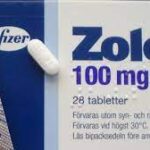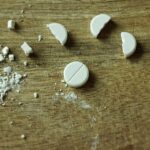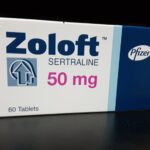How Long Does It Take For Zoloft To Work?

Sertraline, sold under the brand name Zoloft among others, is an antidepressant of the selective serotonin reuptake inhibitor (SSRI) class. The efficacy of sertraline for depression is similar to that of other antidepressants, and the differences are mostly confined to side effects. Sertraline was invented and developed by scientists at Pfizer and approved for medical use in the United States in 1991. It is available as a generic medication. In 2016, sertraline was the most commonly prescribed psychiatric medication in the United States and in 2018, it was the fourteenth most commonly prescribed medication in the United States, with over 38 million prescriptions.
Zoloft is better tolerated than the older tricyclic antidepressants, and it may work better than fluoxetine for some subtypes of depression. Sertraline is effective for panic disorder, social anxiety disorder, generalized anxiety disorder, and obsessive–compulsive disorder (OCD). However, for OCD, cognitive behavioral therapy, particularly in combination with sertraline, is a better treatment. Although approved for post-traumatic stress disorder, sertraline leads to only modest improvement in this condition. Zoloft also alleviates the symptoms of premenstrual dysphoric disorder and can be used in sub-therapeutic doses or intermittently for its treatment.
How does Zoloft work?
Zoloft (Sertraline) is a selective serotonin reuptake inhibitor, or SSRI. Other medications in this class include fluoxetine (Prozac) and paroxetine (Paxil). Zoloft works by increasing the level of serotonin, a major neurotransmitter, in your brain. By increasing serotonin levels, sertraline can help to prevent panic attacks, improve your general mood and stop some obsessive compulsive behaviors.
People with social anxiety disorder also notice benefits from using sertraline, as it can help with some symptoms of anxiety. Zoloft is also associated with increases in ejaculation latency (longer ejaculation time) in men with premature ejaculation and is prescribed off-label to help with that.
How should I take Zoloft?
Take Zoloft exactly as prescribed by your doctor. Follow all directions on your prescription label and read all medication guides or instruction sheets. Your doctor may occasionally change your dose.
Take Zoloft with or without food, at the same time each day.
Zoloft liquid (oral concentrate) must be diluted with a liquid right before you take it. Read and carefully follow all mixing instructions provided with your medicine. Ask your doctor or pharmacist if you need help.
Measure the mixed medicine with the supplied syringe or a dose-measuring device (not a kitchen spoon). Sertraline may cause false results on a drug-screening urine test. Tell the laboratory staff that you use Zoloft.
Do not stop using Zoloft suddenly, or you could have unpleasant symptoms (such as agitation, confusion, tingling or electric shock feelings). Ask your doctor before stopping the medicine.
The standard dose of Zoloft for anxiety is 25 mg or 50 mg per day. According to the Food and Drug Administration (FDA), these are the standard doses of Zoloft for other disorders:
Major depressive disorder: 50 mg daily
OCD: 50 mg per day for those older than 13 years of age
Panic disorder: 25 mg daily
PTSD: 25 mg daily
Social anxiety disorder: 25 mg daily
PMDD: 50 mg per day during the luteal phase only
It’s important to talk with your doctor about what dosage is right for you because, the exact amount of medication you’ll need will vary based on your specific condition, how severe your symptoms are, and whether or not you have any other health problems.
How long does it take for Zoloft to work?
For most people, Zoloft takes two to six weeks to start working effectively. However, many people who use Zoloft notice benefits shortly after starting the medication. When used off-label to treat premature ejaculation, studies suggest it can be used on an as-needed basis.
If you are prescribed Zoloft off-label, be sure you feel comfortable with this option, and if not, request alternative treatment options, and/or more information about why your provider is prescribing this particular medication for you.
What side effects should I expect while using Zoloft?
Get emergency medical help if you have signs of an allergic reaction to Zoloft: skin rash or hives (with or without fever or joint pain), difficulty breathing, swelling of your face, lips, tongue, or throat.
Report any new or worsening symptoms to your doctor, such as: mood or behavior changes, anxiety, panic attacks, trouble sleeping, or if you feel impulsive, irritable, agitated, hostile, aggressive, restless, hyperactive (mentally or physically), more depressed, or have thoughts about suicide or hurting yourself.
Call your doctor at once if you have:
- a seizure;
- vision changes, eye pain, redness, or swelling;
- low blood sodium – headache, confusion, problems with thinking or memory, weakness, feeling unsteady; or
- manic episodes – racing thoughts, increased energy, unusual risk-taking behavior, extreme happiness, being irritable or talkative.
Seek medical attention right away if you have symptoms of serotonin syndrome, such as: agitation, hallucinations, fever, sweating, shivering, fast heart rate, muscle stiffness, twitching, loss of coordination, nausea, vomiting, or diarrhea.
Sertraline can affect growth in children. Your child’s height and weight may be checked often.
Common Zoloft side effects may include:
- indigestion, nausea, diarrhea, loss of appetite;
- sweating;
- tremors; or
- sexual problems.
This is not a complete list of side effects and others may occur. Call your doctor for medical advice about Zoloft overdose or side effects. You may report side effects to FDA at 1-800-FDA-1088. You Can Find More Information on: Why Is Zoloft Causing Lump In Throat Feeling?





